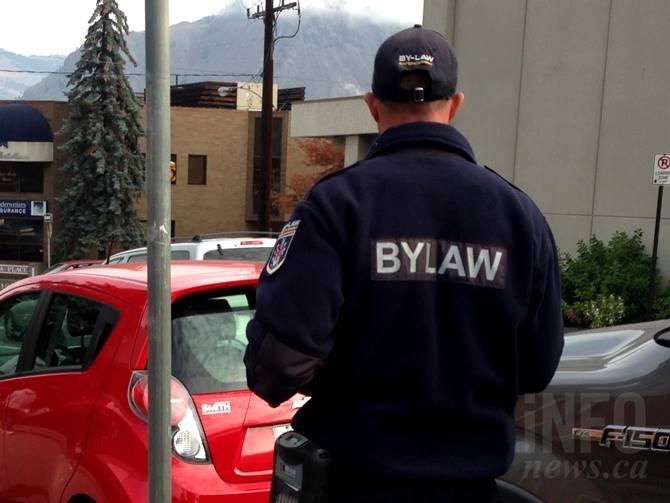
(JENNIFER STAHN / iNFOnews.ca)
February 08, 2019 - 7:30 AM
KELOWNA - More training and new bylaws could go a long way towards easing the cost of public safety for cities throughout B.C.
That’s the position being put forward by the Licence Inspectors’ and Bylaw Officers’ Association of B.C. in its push to create a Community Safety Officer program – something Kamloops and Kelowna are already taking some steps towards.
“These would be municipal employees that would have the authority to enforce municipal bylaws, but going beyond bylaws and starting to deal with some of those social nuisance or public safety concerns,” Steffan Zamzow, the association’s vice-president told iNFOnews.ca. “Why are we sending in a highly-trained police officer to go to a loud music call or drinking in the park? Maybe more focus should be spent on police dealing with criminal acts."
Some B.C. cities are looking at enhancing the power of their bylaw officers but use different terminology.
For example, at budget discussions in Kamloops in December, Coun. Mike O’Reilly suggested training bylaw officers as special provincial constables and staff talked about Bylaw Officer II or III positions. Kelowna is talking about making their bylaw officers into “special constables” and Vernon is also giving bylaw officers increased authority, Zamzow said.
Alberta has a Peace Officer program covered under a provincial Peace Officer Act that allows officers to deal with things like fraud investigations, traffic enforcement and even security for the Premier.
His association wants to standardize training and terminology throughout B.C. in order to fill a gap between private security, bylaw officers, auxiliary police and the RCMP. It’s using the term Community Safety Officers.
A lot of work still needs to be done, including training.
Langford is a leader in the province and brings in contractors to train bylaw officers on things like dealing with angry or drunk citizens. Zamzow’s association is looking at either setting up its own training program or partnering with an organization like the Justice Institute.
The idea is not to replace police officers but to free them up to deal with more serious criminal matters. The RCMP cannot staff enough officers to fill current municipal contracts due to injuries, leaves and replacing retiring officers.
One example he gave is traffic accidents where police officers are required to perform traffic control duties. Safety officers could do that work at a fraction of the cost.
Zamzow didn’t speak against the RCMP’s Auxiliary Police program, which is currently on hold. Auxiliaries are volunteers who generally have to be accompanied by a police officer and cannot deal with bylaw issues – just as bylaw officers can’t currently deal with criminal code violations.
But, if municipalities changed their bylaws or wrote new ones, they could give more authority to their own bylaw officers. Right now, for example, bylaw officers are empowered by the province to enforce most traffic violations (except for speeding) but are not empowered by most municipalities to do that work.
What they could replace is private security companies, being used increasingly to patrol city streets.
“Would you, as a municipality, rather have your own staff with your own uniform, your own crest identifying you as a city employee, dealing with public safety rather than a third party entity more concerned about making a profit?” Zamzow asked, adding that private security can only “observe and report,” not enforce the laws.
Of course, liability would be an issue as cities are liable for the health and safety of their employees. Zamzow said those costs can be minimized by proper training.
Besides, he added, the cost of bylaw officers are one half to one third the cost of a police officer. Wages for bylaw officers vary by city and would likely be negotiated up for Safety Officers because of their increased levels of trainng and responsibility.
Still, his association puts the cost of a Safety Officer at about $90,000 per year (including benefits) versus close to $190,000 for a police officer.
Zamzow made his comments, in part, in reaction to statements made by former Kelowna RCMP Inspector Bill McKinnon to Kelowna city councl last fall. In his report, McKinnon said bylaw officers “have no more authority than a common citizen.”
That’s true when it comes to enforcing Criminal Code offences, Zamzow said. But bylaw officers have much more authority than “common citizens” when it comes to enforcing bylaw offences.
With proper training and changes to municipal bylaws, their authority could be greatly enhanced and they can be empowered to deal with public safety issues and some criminal code offences.
The Licence Inspectors’ and Bylaw Officers’ Association of B.C. is voluntary to join and bills itself as “the voice of bylaw enforcement in B.C.” on its website.
- This article was corrected Feb. 8, 2019 at 12:23 p.m. Vernon is not a city looking into this program. An earlier version said Langley was leading the way when in fact, it's Langford, B.C.
To contact a reporter for this story, email Rob Munro or call 250-808-0143 or email the editor. You can also submit photos, videos or news tips to the newsroom and be entered to win a monthly prize draw.
We welcome your comments and opinions on our stories but play nice. We won't censor or delete comments unless they contain off-topic statements or links, unnecessary vulgarity, false facts, spam or obviously fake profiles. If you have any concerns about what you see in comments, email the editor in the link above.
News from © iNFOnews, 2019